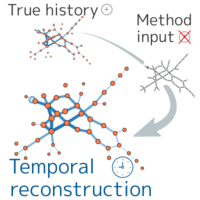当前位置:
X-MOL 学术
›
Phys. Rev. X
›
论文详情
Our official English website, www.x-mol.net, welcomes your feedback! (Note: you will need to create a separate account there.)
Phase Transition in the Recoverability of Network History
Physical Review X ( IF 12.5 ) Pub Date : 2019-12-17 , DOI: 10.1103/physrevx.9.041056 Jean-Gabriel Young , Guillaume St-Onge , Edward Laurence , Charles Murphy , Laurent Hébert-Dufresne , Patrick Desrosiers
Physical Review X ( IF 12.5 ) Pub Date : 2019-12-17 , DOI: 10.1103/physrevx.9.041056 Jean-Gabriel Young , Guillaume St-Onge , Edward Laurence , Charles Murphy , Laurent Hébert-Dufresne , Patrick Desrosiers

|
Network growth processes can be understood as generative models of the structure and history of complex networks. This point of view naturally leads to the problem of network archaeology: reconstructing all the past states of a network from its structure—a difficult permutation inference problem. In this paper, we introduce a Bayesian formulation of network archaeology, with a generalization of preferential attachment as our generative mechanism. We develop a sequential Monte Carlo algorithm to evaluate the posterior averages of this model, as well as an efficient heuristic that uncovers a history well correlated with the true one, in polynomial time. We use these methods to identify and characterize a phase transition in the quality of the reconstructed history, when they are applied to artificial networks generated by the model itself. Despite the existence of a no-recovery phase, we find that nontrivial inference is possible in a large portion of the parameter space as well as on empirical data.
中文翻译:

网络历史记录可恢复性中的相变
网络增长过程可以理解为复杂网络的结构和历史的生成模型。这种观点自然导致了网络考古学的问题:从网络的结构重建网络的所有过去状态,这是一个困难的排列推理问题。在本文中,我们介绍了网络考古学的贝叶斯表述,将优先依附性概括为我们的生成机制。我们开发了一种顺序蒙特卡罗算法来评估该模型的后验平均值,以及一种有效的启发式算法,该算法可在多项式时间内揭示与真实值很好相关的历史记录。当将这些方法应用于模型本身生成的人工网络时,我们将使用这些方法来识别和表征重建历史的质量。
更新日期:2019-12-18
中文翻译:

网络历史记录可恢复性中的相变
网络增长过程可以理解为复杂网络的结构和历史的生成模型。这种观点自然导致了网络考古学的问题:从网络的结构重建网络的所有过去状态,这是一个困难的排列推理问题。在本文中,我们介绍了网络考古学的贝叶斯表述,将优先依附性概括为我们的生成机制。我们开发了一种顺序蒙特卡罗算法来评估该模型的后验平均值,以及一种有效的启发式算法,该算法可在多项式时间内揭示与真实值很好相关的历史记录。当将这些方法应用于模型本身生成的人工网络时,我们将使用这些方法来识别和表征重建历史的质量。


























 京公网安备 11010802027423号
京公网安备 11010802027423号